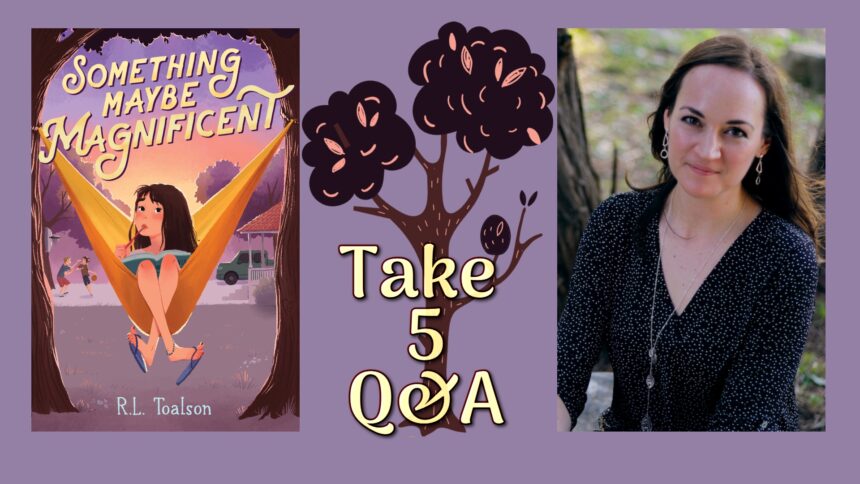Take Five: Rachel Toalson and SOMETHING MAYBE MAGNIFICENT
By Writer Unboxed | May 26, 2024 |

We are delighted to bring you a first look at the new book of award-winning middle-grade author and WU contributor Rachel Toalson. SOMETHING MAYBE MAGNIFICENT is a sequel to last summer’s release, and as it was then, this book is receiving great pre-release buzz, such as:
“This sequel thoughtfully and sincerely explores themes of womanhood, family, anxiety, and identity…Tugs at the heartstrings and shows the importance of unconditional love.”–Kirkus Reviews
Ready to take a deeper dive? Here’s Rachel!
Q1: What’s the premise of your new book?
Rachel Toalson: There’s a new man in her mom’s life and 13-year-old Victoria Reeves is determined to get rid of him, whatever it takes.
This summer she’s reading Sylvia Plath and trying to get published, she’s growing up and getting used to her monthly “visitor,” and she’s coming to terms with her relationship with her estranged father while she grapples with her evolving views of womanhood. But the biggest bump in her “magnificent summer plans” is her mom’s new boyfriend, Kyle Moreland.
To protect her mom and family from this unwelcome interloper, Victoria plays pranks on Kyle, blames him for messes and spills, and tries to make his life as miserable as she possibly can so he’ll go away. Meanwhile, she wrestles with the knowledge that this mean person doing these mean things isn’t really who she is. And she’s not sure it’s who she wants to be. But you have to do what you have to do to protect your family, right?
When things go a little too far, Victoria has to decide whether she’ll continue building her walls of self-protection or if she’ll let someone new–someone who might be a really good guy–step into the gap her father left and help her and her family move on.
Something Maybe Magnificent is a sequel to last summer’s release, The First Magnificent Summer, but it also stands alone and can be read without reading the first.
Q2: What would you like people to know about the story itself?
RT: This story is a very personal story for me, as was The First Magnificent Summer. When my stepfather came into my life, I reacted exactly the way Victoria reacts. I did most of the things she does. In fact, this story is basically our story.
Kids of divorce aren’t always welcoming to the people who come into their parents’ lives after a divorce. There’s a very quiet, persistent hope that says, Maybe Mom and Dad will get back together and things will be better than before, despite all the evidence to the contrary. I’m a child if divorce. I know this hope can oftentimes blind us to the love and wonder of potential stepparents.
This book is a realistic picture of that struggle, but it’s also a celebration of good stepparents. The ones who stick around and say, I’m gonna love you the best way I know how, because you’re magnificent and you deserve it. That’s what my stepfather did for me and my brother and sister. Good stepparents step into the gap left by a parent, and they love kids the way they should be loved, which is to say unconditionally, without expectation, without end.
Q3: What do your characters have to overcome in this story? What challenge do you set before them?
RT: Victoria is in an interesting time period of life. Adolescence is fraught with changing emotions and changing bodies and the very real reality of growing up. So she’s wrestling with all her feelings about growing up and becoming a young woman while she’s also trying to come to terms with everything changing (and she doesn’t do well with change). She’s confused about feelings (she might have a crush on the boy next door, but she’s not sure–and not sure she should have a crush, because she’s a feminist). She’s trying to figure out what it really means to be a feminist. She’s flying one day and despairing the next. She’s stepping in as Second Mom to her brother and sister, because her mom has to work a lot, which strains her relationships with her siblings.
So while adolescence is throwing her all these obstacles, because that’s what adolescence does, she also has to overcome her prejudices about stepparents. (She says, “I’ve read all the fairy tales. I know all about stepparents.”) She has to live with what she’s doing and ask herself, Is this really who I am? Is this who I want to be? She has to figure out if she’s okay with all the self-protective walls she’s built around her heart to keep her from getting hurt–and the way they alienate her from genuine relationships with other people. It’s a lot for a 13-year-old to deal with.
But kids are wrestling with these things every day. And I’d like to think they’ll recognize pieces of themselves in Victoria’s story.
Q4: What unique challenges did this book pose for you, if any?
RT: This book was probably one of the easiest books for me to write, possibly because it’s a followup to another book, so I already had the voice of the character and the structure of the story in place. Plus, it’s such a personal story that it almost felt like I was writing in my own journal (the book is structured with journal entries), in my own voice. Even the humor was easier to access than it was in the first book, because my character is so clearly drawn in my mind, after having spent so much time with her in the first book. I suppose that’s the gift of books that feature the same characters.
The hardest part for me, really, was figuring out the timeline. Since the book is time-stamped with journal entries, I had to make sure my dates and times were accurate. This is probably one of the more challenging pieces of any of my novels anyway. I like to write and not pay attention to the fact that I have three Fridays in a row. My weeks are magical. And you can’t have magical weeks in realistic fiction. So revising all of that for this book was a bit of a mess. I’ve since added a calendar to my brainstorm process so I don’t have to figure out timing after the book’s “finished!”
Q5: What has been the most rewarding aspect of having written this book?
RT: I love celebrating stepparents. I’m not a stepparent myself, and neither is my husband, but we both have stepparents. And, you know, some stepparent stories are good and some are bad, and I just happen to have a very good stepparent story. My stepfather is my dad. He’s one of the most amazing people you’ll ever meet. So honoring him with this story (the book’s dedicated to him) has been a real joy. And I think we need more stories honoring the remarkable work that good stepparents do to heal kids with broken families.
I also really love that this book raises some questions about feminism that young women are sometimes afraid to ask. Can feminists like makeup? (Yes.) Can feminists love fashion? (Yes.) Can feminists have a crush? (Yes.) Victoria and her grandmother discuss what a feminist looks like (short answer: Feminists look like all of us!), and I hope those threads in the book help young readers understand that there is no formula for feminism and we get to be who we want to be–and we’re magnificent wherever we end up!
Congratulations on your new book, Rachel! Thank you for sharing this preview with us today.
WU Community, you can learn more about Rachel and the new book on her website, and by following the buy-links below. Read on!










Not ever having had a stepparent I got a lot out of this post! Congratulations on your new book and so glad you’re pleased with how you were able to tell your story. Thank you for sharing.
Thank you so much, Susan!
Hello Rachel.
Q5:”What has been the most rewarding aspect of having written this book?”
RT: “I love celebrating stepparents. I’m not a stepparent myself, and neither is my husband, but we both have stepparents.”
As a stepparent, I celebrate you for going to bat for people who so often get the side eye or worse. Since something like 50% of marriages end in divorce, it makes very good sense for you to make stepparenting one of your subjects. I’m sure a lot of people will benefit from what you’ve chosen to do. Thanks!
I hope they do benefit, Barry! And thanks for being one of the good ones. :)
Good one, Rachel. This piece is not just a plug. It’s useful not just in terms of what your book is “about,” but in the way it discusses the wrench in any adolescent’s universe when the established order suddenly changes. Of course the new boyfriend is a terrible, evil person. He’s trying to replace your dad. This is one of the great things about YA fiction: It reminds us how huge and important and personal everything was when we were just taking shape. In my own life, I briefly played the part of the new boyfriend, but I never became the stepfather. It was all very dramatic, nevertheless.
Absolutely, Michael! Everything is dramatic when we’re young–and I love exploring that in my stories. My kids lead the way for me. :)
But who wouldn’t want three Fridays in a row? I applaud your creative attempts to fix our broken calendars.
This book sounds MAGNIFICENT, and three cheers for your inclusion of feminism. Congratulations, Rachel!!
Thank you, Therese! And for all your support.